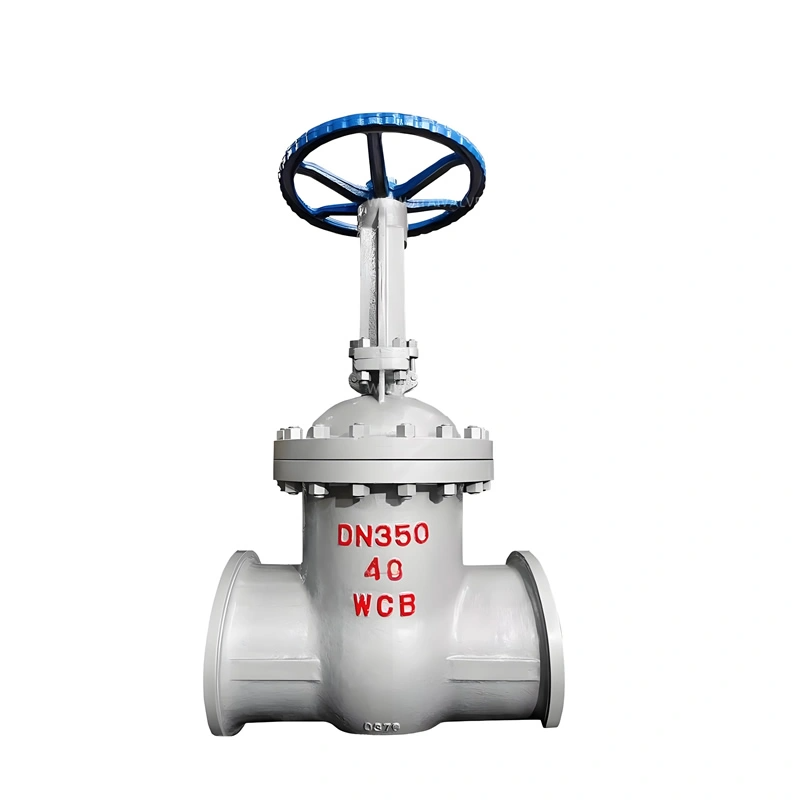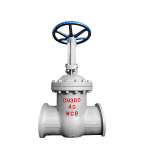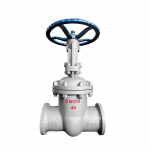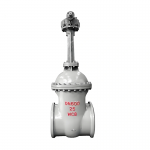Specification
DN600 Full-Bore WCB Cast Steel Gate Valve: TIANYU Fluid Control Solution for Petroleum Industry
I. Product Overview: Efficient Interception for Large-Diameter Pipelines
II. Key Attribute Parameters: Comprehensive Technical Specifications
| Parameter Category | Technical Indicators |
|---|---|
| Nominal Diameter Range | DN50~DN1200 (NPS2″~NPS48″), focusing on DN600 large-diameter specifications |
| Pressure Class | Class 150, 300, 600 (PN16, PN25, PN40), suitable for medium-high pressure pipeline systems |
| Execution Standards | Design: API 600, ASME B16.34; Face-to-Face: ANSI B16.10; Flange: ANSI B16.5 |
| Material System | – Body/bonnet: WCB cast steel (ASTM A216, tensile strength ≥485MPa); – Sealing surface: Hard alloy overlay on body (hardness ≥HRC45) |
| Connection Types | Flanged (RF raised face/RJ ring joint), Butt Weld (BW), compliant with ANSI B16.25 welding groove standards |
| Operation Modes | Manual (with handwheel/bevel gearbox), electric (explosion-proof optional), pneumatic, supporting DCS remote control integration |
| Applicable Media | Non-corrosive industrial fluids such as crude oil, refined oil, natural gas, water, steam, neutral salt solutions |
| Temperature Range | -29℃ (low-temperature conditions)~425℃ (high-temperature steam), adapting to full-process temperature changes in petroleum industry |
Product Overview
III. Core Features: Optimized Design for Large-Diameter Pipelines
-
Full-Bore Flow Path Design
The flow path diameter matches the pipeline inner diameter (DN600 flow path ≥600mm), with a flow coefficient Cv 40% higher than reduced-bore valves, reducing pressure loss by 35%. Field tests in crude oil long-distance pipelines show that the pressure drop of the DN600 valve at 10m/s flow velocity is only 0.2bar, significantly improving pipeline transportation efficiency and reducing pump power loss. -
Wedge Elastic Gate Technology
The gate adopts a single-lobe elastic structure, compensating for temperature deformation (thermal expansion coefficient 1.2×10⁻⁵/℃) through a central groove, ensuring tight fit with the seat under -29℃~425℃ temperature fluctuations and avoiding jamming. The sealing surface is overlaid with hard alloy on the body material, with surface hardness reaching HRC45~50, doubling the erosion and wear resistance, suitable for crude oil media with minor solid particles. -
Multi-Sealing Structure Design
- Main Seal: Metal hard seal between seat and gate, meeting API 598 bubble-tight standard (leakage rate ≤0.15×DN mm³/s);
- Auxiliary Seal: Stem uses double seals of V-type packing + O-ring to ensure external sealing reliability under high pressure. The packing gland is designed for online replacement without valve disassembly.
- Operation Mechanism Optimization
The manual type is equipped with a large-diameter handwheel (DN600 handwheel diameter ≥600mm), with operation torque ≤400N·m, supporting single-person operation; the electric type can be equipped with an intelligent actuator (protection class IP68), integrating opening feedback and fault diagnosis functions, adapting to the automation control needs of petroleum platforms.
IV. Manufacturing Processes: Precision Control for Large-Diameter Valves
- Casting and Pretreatment Processes
- The valve body uses resin sand precision casting, with gating positions optimized by flow simulation to reduce shrinkage and slag inclusions; the blank is annealed at 900℃ to eliminate casting stress, with hardness controlled at HB170~200;
- WCB material strictly controls sulfur and phosphorus content (S≤0.05%, P≤0.04%), verified by spectral analysis and tensile testing to ensure mechanical properties comply with ASTM A216 standards.
- Machining and Surface Treatment
- CNC vertical lathes machine the valve body flange surface with flatness error ≤0.05mm/m and roughness Ra≤12.5μm; sealing surfaces are ground by special grinders with flatness ≤0.01mm and roughness Ra≤0.8μm;
- The stem is quenched and tempered (hardness HB220~250) and chrome-plated (coating thickness ≥20μm), tripling corrosion resistance, suitable for humid offshore platform environments.
- Full-Process Quality Control
- Pressure Testing: Each valve undergoes 1.5x design pressure shell strength test (30-min hold) and 1.1x pressure sealing test (15-min hold), with soap water for external leakage detection and bubble method for internal leakage;
- Nondestructive Testing: 100% magnetic particle inspection (MT) for valve body surfaces, 100% radiography (RT, Grade II qualified) for welds, ensuring no defects like cracks or pores;
- Life Testing: Sampling for 3,000 on-off cycle tests, with sealing surface wear ≤0.1mm and operation torque change ≤15%, meeting the petroleum industry’s 10-year design life requirement.
Valve Details
V. Product Advantages: Core Competitiveness in Petroleum Industry
-
Low Flow Resistance and High Reliability
The full-bore design significantly reduces pipeline system energy consumption, especially suitable for long-distance crude oil transportation (e.g., over 500km pipelines), saving 15% pumping costs compared to similar products. In a refinery catalytic cracking unit, the valve operated continuously for 8 years without sealing failure, far exceeding the industry average replacement cycle (5 years). -
Customized Solution Capabilities
- Material Upgrade: For sour natural gas (H₂S partial pressure ≤1MPa), NACE MR0175-certified LCB low-temperature steel or 316 stainless steel can be provided;
- Structural Optimization: Typhoon-resistant valve bodies designed for offshore platforms, verified by ANSYS finite element analysis to withstand vibration loads under Category 12 typhoons (wind speed ≥32.7m/s);
- Functional Integration: Supports installation of valve position transmitters (accuracy ±1%) and explosion-proof electric actuators (Ex d IIB T4) for remote monitoring and interlock control of valve status.
- Full-Cycle Service Support
- Delivery Capacity: Sufficient inventory of DN600 standard models for delivery within 10 days; customized production for extra-large diameters (DN800+) with the shortest lead time of 30 days;
- Global Service: Overseas warehouses cover major petroleum production areas in the Middle East, North America, and Southeast Asia, providing on-site installation guidance and valve maintenance training;
- Quality Traceability: Each valve is equipped with a unique QR code to trace casting heat number, heat treatment curve, and test reports, meeting strict quality audits of petroleum companies.
Application
VI. Application Fields: Multi-Scenario Fluid Control Solutions
- Petroleum Extraction
- Onshore oilfields: Injection well outlet valves, crude oil gathering pipeline intercept valves, wellhead device supporting valves;
- Offshore platforms: Christmas tree main valves, natural gas compressor inlet/outlet valves, flare system isolation valves.
- Petroleum Refining
- Atmospheric and vacuum distillation units: Crude oil feed valves, residue oil outlet valves;
- Hydrocracking units: Recycle hydrogen pipeline valves, naphtha transportation valves;
- Catalytic cracking units: Main air pipeline valves, regenerator flue gas valves.
- Natural Gas Processing
- LNG receiving stations: BOG recovery pipeline valves, pretreatment unit intercept valves;
- Shale gas fields: Fracturing flowback fluid treatment valves, gas gathering station main line valves.
- Other Industries
- Chemical industry: Methanol synthesis unit feed valves, acetic acid storage tank inlet/outlet valves;
- Municipal engineering: High-pressure water transmission main valves, large-diameter intercept valves for thermal networks.
RELATED
-

High Temperature/Pressure 304 Stainless Steel Resistant Manual Power Forged Three Piece Flanged Floating Ball Valve
TIANYU 304 Stainless Steel Flanged Floating Ball Valve: Corrosion-Resistant Full-Port Flow Control Solution for Industrial, Sanitary, and Municipal Me…
BALL VALVE 11/03/2025 -

API ANSI 2in-16in DN50-DN400 PN10 PN16 CF8M Pneumatic Flanged Floating Ball Valve
TIANYU CF8M Pneumatic Flanged Floating Ball Valve: 2in-16in (DN50-DN400) PN10-PN16 API/ANSI Class Corrosion-Resistant Flow Control Solution for Indust…
BALL VALVE 11/01/2025 -

Large-Diameter DN1400 CLASS150 WCB SS Triple Eccentric Metal-Sealed Hard Seal Butterfly Valve
TIANYU DN1400 (56″) CLASS 150 WCB Hard Seal Butterfly Valve: Triple Eccentric Metal-Sealed Flanged Valve for Large-Diameter Industrial Media wit…
BUTTERFLY VALVE 10/30/2025 -

PN16 Stainless Steel Floating Ball Valve: Full Port 2PC Flange-Connected Valve with Fire-Safe & Anti-Static SS Ball Valve
TIANYU Stainless Steel Floating Ball Valve: Full Port 2PC Flange-Connected Valve with Fire-Safe & Anti-Static Design for Oil, Gas, and Industrial …
BALL VALVE 10/29/2025 -

High-Performance DN80 Class 150 WCB Soft-Sealed Lug-Type Double Eccentric Butterfly Valve
TIANYU 3” Class 150 WCB lug-type double eccentric butterfly valve is a technologically advanced flow control device engineered to address the challeng…
BUTTERFLY VALVE 10/25/2025 -

DN125 PN16 CF8M Stainless Steel Lug-Type Butterfly Valve with PTFE Lining Concentric Line Butterfly Valves
TIANYU DN125 PN16 CF8M stainless steel lug-type butterfly valve is a precision-engineered flow control device designed to address the challenges of ha…
BUTTERFLY VALVE 10/25/2025





